Vihaan gets up early, though perhaps “up” is the wrong word; it implies a distinction between a place of rest and the city beyond. For Vihaan, there is no such distinction. He sleeps alongside four others in a room that opens directly onto the streets of Old Delhi. As he rises, he reaches for a blue, sun-faded bucket, fills it nearly to the brim, and pours the water over his body, wiping off the residual sweat and dirt clinging to his skin.
He steps forward, pushing aside a blue tarp as he produces an old key from his worn and tired trousers. Bending down, he unlocks the padlock on his rickshaw and pushes it into the street. The streets are coming alive as the markets prepare to open at 10 AM, but Vihaan is not in the business of markets.
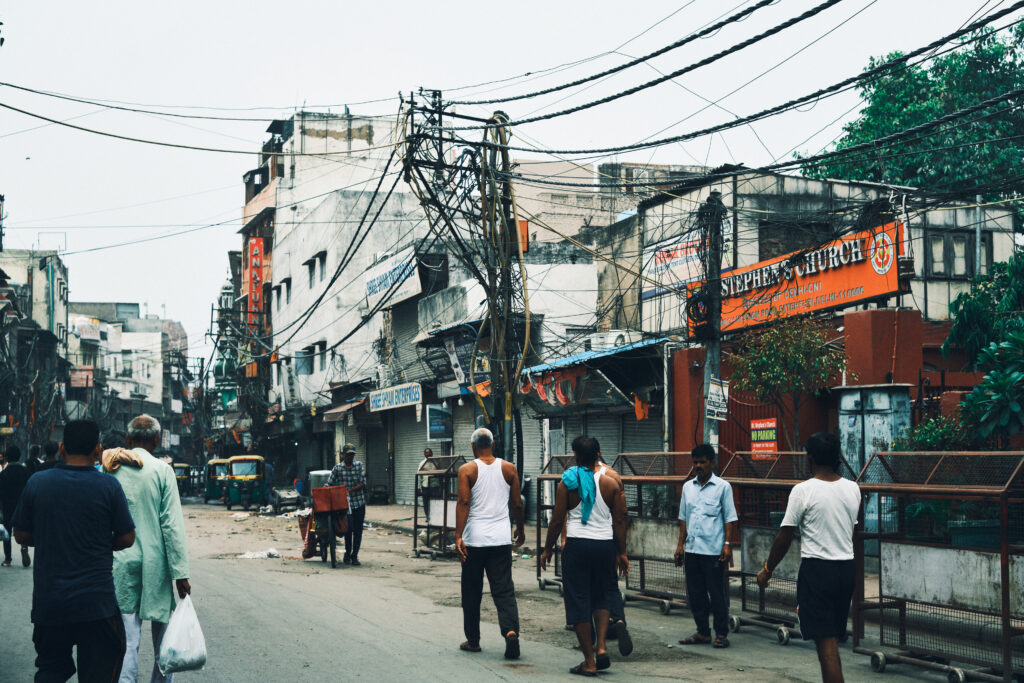
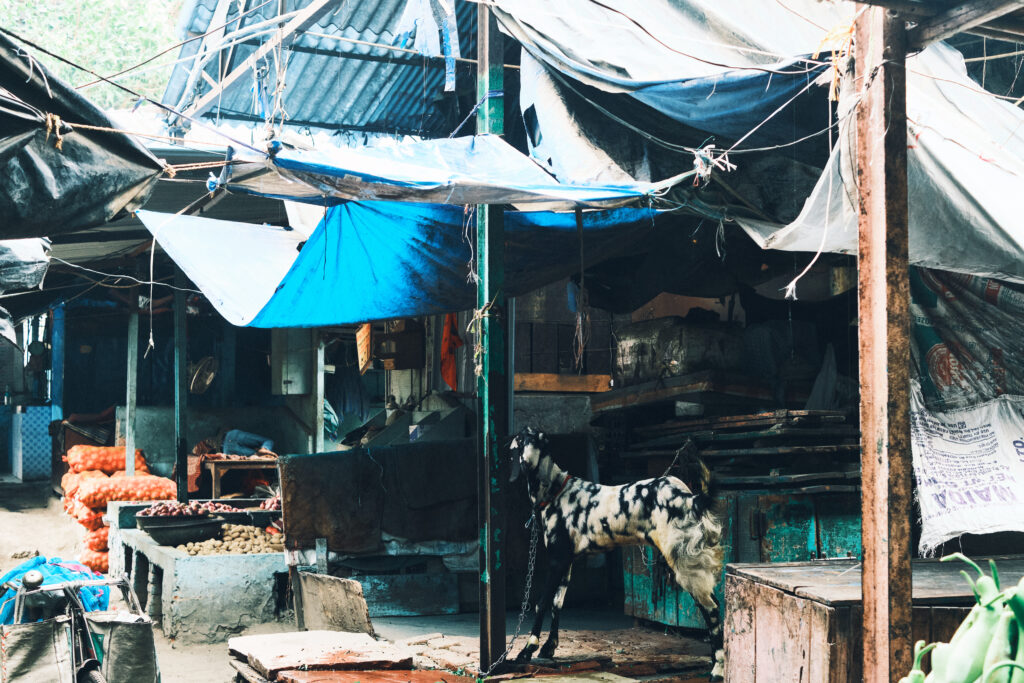
Pedalling through the streets outside the Old Delhi railway station, he passes by a tourist. Pulling into earshot and slowing down, he offers a one-hour tour around Old Delhi for 600 rupees. The price is naturally high, but newcomers to Delhi have no frame of reference, and if wealthy tourists are willing to part with their cash, why should he stop them? Over the impatient horns behind him, a counteroffer of 200 rupees is heard—less than he would have liked but work in the early hours is uncertain and so he accepts.
The first stop is Jama Masjid, Delhi’s principal mosque. As he pedals, Vihaan’s passenger looks on with curiosity and concern. The streets of Delhi are like no other—the buildings spill onto the street, and those who enter the belly of the beast, seeking opportunity, can find themselves abandoned and isolated amidst the chaos.
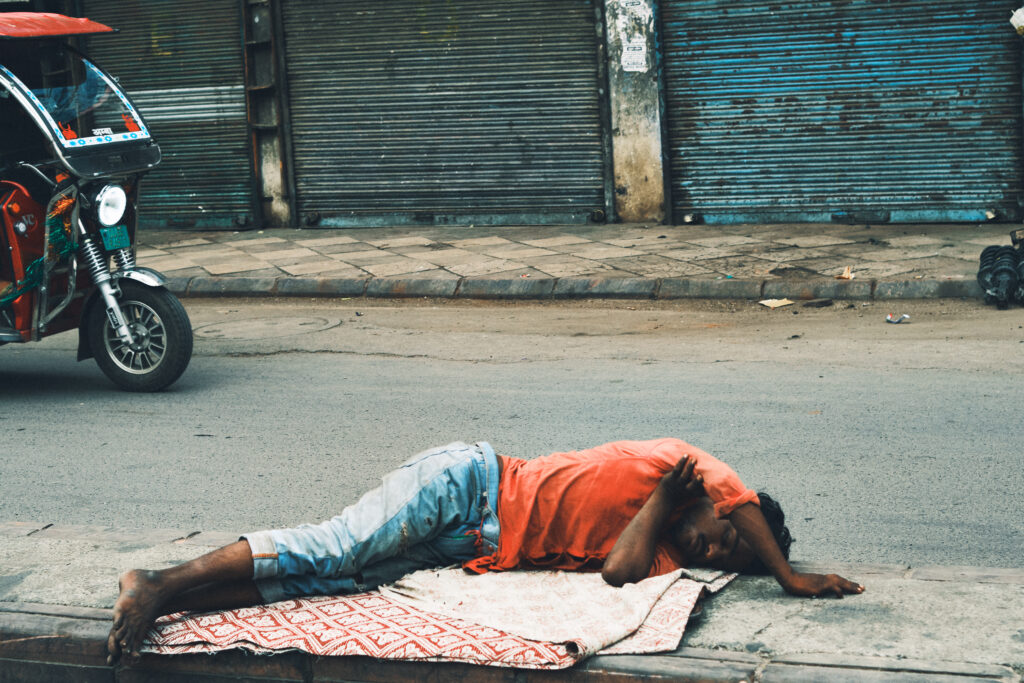
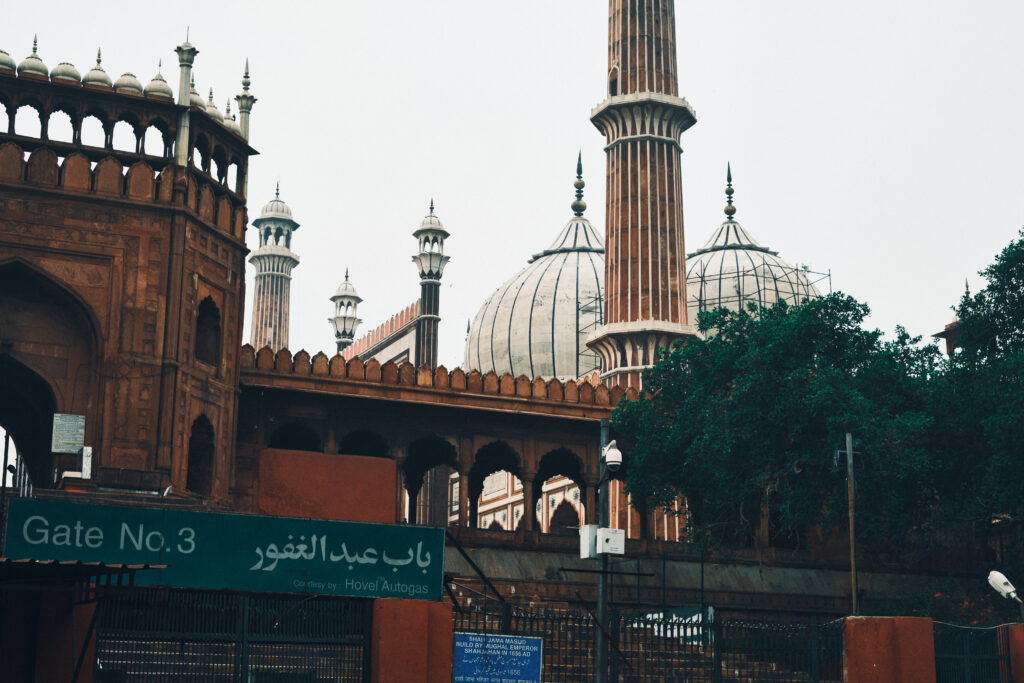
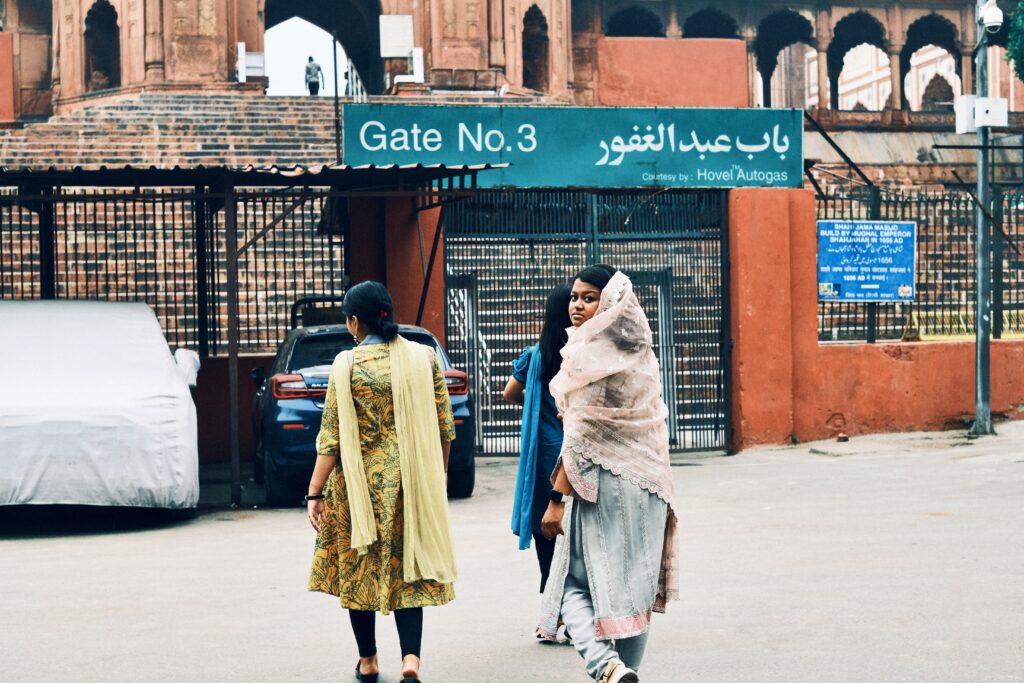
The pillars of Jama Masjid tower into the skyline as Muslims wait by the gates for the mosque to open. Since the mosque is closed until 9 AM, it is only possible to walk around the outside. Cautioning his passenger against pickpockets and shooing away those who come to beg, his passenger soon returns and Vihaan continues to the Mahatma Gandhi Memorial Park. Sweat begins to cover his body once more; the temperature is cooler than in recent weeks, which saw highs of 50 degrees, but there is simply no way to stay cool. The stopping and starting of the traffic, the incessant honking—the work is draining. As his passenger leaves the rickshaw and makes his way into the park, Vihaan catches his breath.
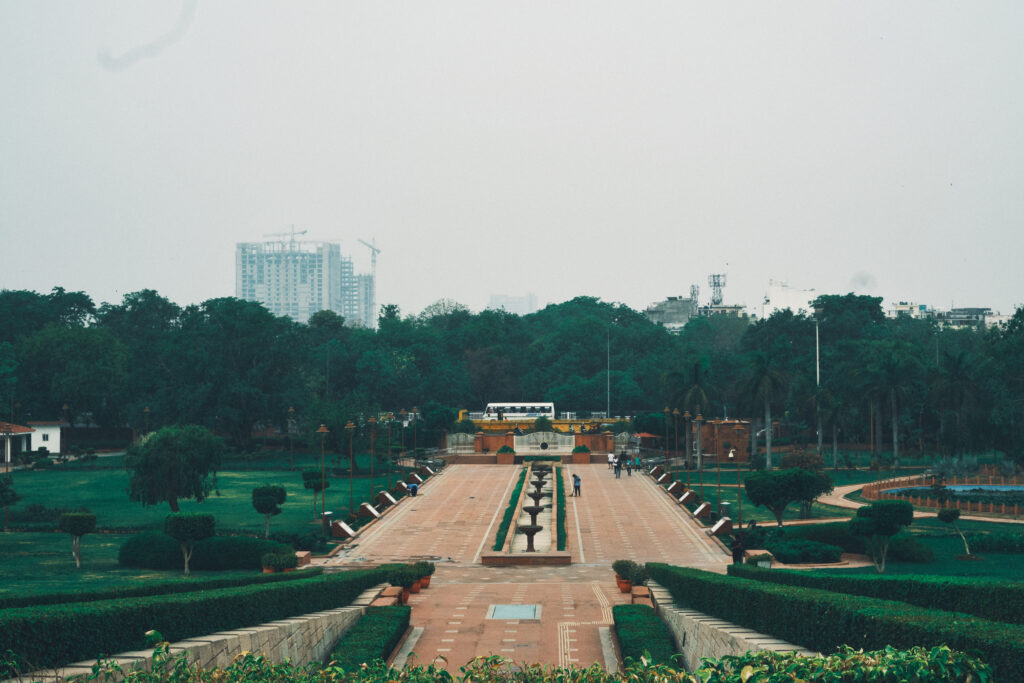
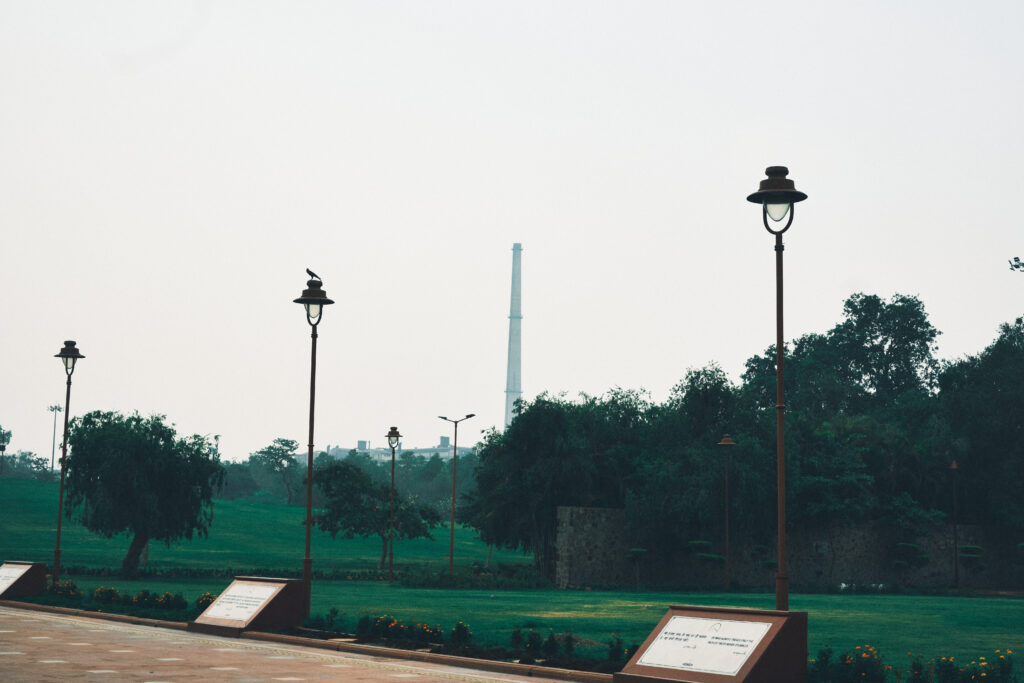
It isn’t long before his passenger returns with a smile on his face. Vihaan knows this smile, and it gives him a sense of pride. The Mahatma Gandhi Memorial Park is a beautiful place; it is the first memorial dedicated to Mahatma Gandhi, where a black marble platform was raised to mark the spot of his cremation in 1948. The park is clean, with Gandhi’s words engraved on polished stone across the vast open green space. The trees that dot the skyline stand in stark contrast to the city just a kilometre away. No matter what foreigners may think in their own countries, the park never fails to impress them.
His passenger insists on visiting the book and spice markets, which won’t open until later, but Vihaan tries his best to oblige. Turning onto the roads of the book market, it becomes harder to pedal. Feeling the weight of his passenger, the destroyed road, and the hills, Vihaan begins to slow down. Gesturing to the schools, he explains, “This is where the good children go.” He wants to clarify that by “good,” he means “wealthy,” and hopes his passenger understands. There is no opportunity to stop for rest as the stores are all closed, but doing his best to keep his passenger entertained, he points out the bikes with trailers, explaining that children are taken to school in these.
A confused grin spreads across his passenger’s face, thinking at first that this might be a cruel joke—that naughty children are piled into a metal box in sweltering heat; but this is not a punishment but a privilege, it is why Vihaan moved to Delhi—to give his daughter the opportunity to be schooled.
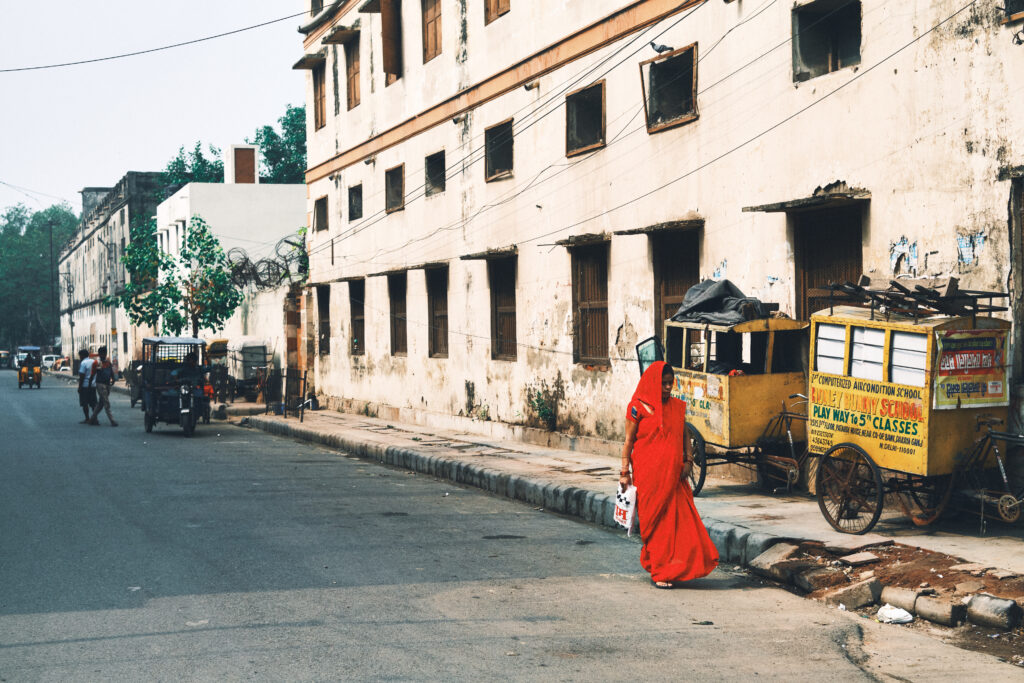
As Vihaan turns down another narrow street, he explains to his passenger that the fabric market is close by and worth a visit. As they approach the market, the buildings seem to press in, their crumbling facades a patchwork of faded colours and peeling paint. Vihaan gestures to one of the buildings; he does not tell the passenger, but he knows the people who work there. If his passenger buys anything, Vihaan will receive a kickback.
Vihaan and his passenger ascend a narrow flight of stairs, each step creaking under their weight. The shop they enter is an explosion of colour—bolts of fabric stacked high, their vibrant hues fighting for attention in the dimly lit room. Vihaan gestures for his passenger to sit on a low cushion as the shopkeepers emerge carrying rich silks and soft cottons. But Vihaan’s heart sinks as he sees the disinterest on his passenger’s face. Tense glances fly across the room, and they soon descend the stairs in silence.
Back on the rickshaw, Vihaan pedals onwards. The spice market is their next stop. As they draw closer, the air becomes dense with the heady aroma of cumin, coriander, and cardamom. But as they arrive, the market is still largely shuttered, save for one solitary merchant. Gesturing to his passenger to wait, Vihaan approaches the merchant and strikes up a deal, hoping his passenger will be more interested in spice than fabric. But alas, he is not.
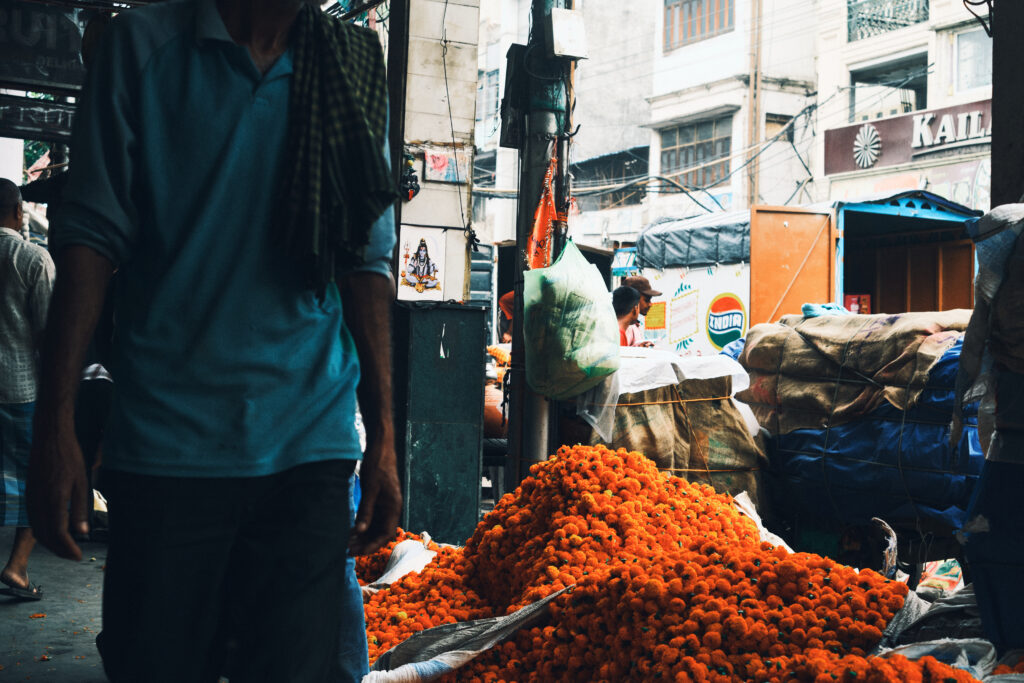
Finally, at the passenger’s insistence, the rickshaw returns to the Old Delhi railway station. As they stop, Vihaan asks for 1000 rupees—the trip has lasted two hours, far longer than the initial agreement, and 200 rupees is no longer a fair price. But the passenger refuses, offering only 400 rupees.
A flash of anger crosses Vihaan’s mind; it seems unjust that this man, who clearly has means—how else could he afford to travel to India—would quibble over a few hundred rupees? The plane ticket alone, Vihaan thinks, must have cost more than he could ever hope to earn in a year. The situation grows tense as other rickshaw drivers gather around. Eventually, his passenger concedes, offering 500 rupees with a reluctant hand. As Vihaan watches him root through his pockets, he catches a glimpse of a wad of bills—what must be over 4000 rupees. The money exchanges hands, and Vihaan watches as his passenger disappears into the crowd.
Photos by Jacob Simmons